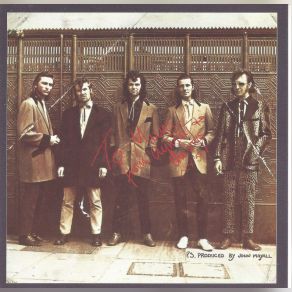To Mum, from Aynsley and the Boys
Download links and information about To Mum, from Aynsley and the Boys by Anysley Dunbar Retaliation. This album was released in 1969 and it belongs to Rock, Blues Rock, Progressive Rock genres. It contains 8 tracks with total duration of 40:15 minutes.

|
|
|---|---|
| Artist: | Anysley Dunbar Retaliation |
| Release date: | 1969 |
| Genre: | Rock, Blues Rock, Progressive Rock |
| Tracks: | 8 |
| Duration: | 40:15 |
| Buy it NOW at: | |
| Buy on iTunes $7.92 | |
Tracks
[Edit]| No. | Title | Length |
|---|---|---|
| 1. | Don't Take the Power Away | 4:02 |
| 2. | Run You off the Hill | 5:43 |
| 3. | Let it Ride | 4:59 |
| 4. | Journey's End | 5:47 |
| 5. | Down, Down and Down | 5:58 |
| 6. | Unheard | 2:22 |
| 7. | Sugar on the Line | 4:26 |
| 8. | Leaving Right Away | 6:58 |
Details
[Edit]Although a fourth Aynsley Dunbar Retaliation album (Remains to Be Heard) would be cobbled together from outtakes and recordings done without Dunbar, their third LP, To Mum, From Aynsley and the Boys, was truly the final proper full-length release by the original group. Dunbar had expressed some interest in moving further afield from the blues-rock format around the time the record was done, and the addition of keyboardist Tommy Eyre (from the Grease Band) to the lineup was one step in that direction. The enlistment of John Mayall as producer was perhaps another step in attempting to refine their sound. Still, much of To Mum, From Aynsley and the Boys is pretty standard late-'60s British blues-rock, in line with the previous two albums by the band. Eyre does inject some of the arrangements with a jazzy, more R&B feel, particularly on "Leaving Right Away" and the instrumental "Unheard," the latter of which sounds like a rock band trying to do modern jazz and finding themselves a bit out of their depth. You also hear the quintet trying to stretch boundaries a little with the eerie, trumpet-overlaid intro to "Don't Take the Power Away," which has the downcast ambience typical of quite a bit of the Victor Brox-sung Aynsley Dunbar Retaliation material. There's also some exceptionally funereal organ in the march-plodding instrumental "Journey's End." Otherwise, though, much of this is rather-run-of-the-mill, if always well played, British blues-rock.